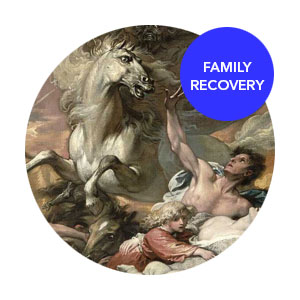FAMILY RECOVERY
The apocalypse is coming! Or at least it might seem so from the degree of family fights and arguments. The concept of The Four Horsemen was originally designed for couples therapy by John Gottman, Ph.D. as he studied multiple marriages over many decades. His observational work led to a greater understanding of what causes marriages to break down. The Four Horsemen may be his most cited work and is useful for early family therapy in recovery.
It is important to note that these principles are the most helpful once your family member has reached some baseline sobriety. If the addicted individual is actively drinking or using, that needs to be addressed first because they are not likely to competently process information when under the influence. Looking into these patterns within a relationship or marriage tends to be useful for more stable situations. Overall, these patterns will need to be dealt with to secure a long-term recovery.
The core components of these issues involve communication problems. Interestingly, all couples communicate. They may not communicate well, and they may not all communicate with words. They might use silence or avoidance as a form of communicating or demonstration of a temper. Outright physical violence is visible aggression, but the concept of microaggression needs to be acknowledged.
Criticism
So much tension in relationships is due to criticism. In walking through everyday life, we make mistakes and forget things that need to be done. There is a huge difference between addressing something you would like to see happen and criticizing your partner for it not getting done. Criticism usually goes after core traits of your partner rather than keeping things about the specific goal. For instance, instead of saying:
“Can you take the trash out tonight? We forgot to put it out last week.”
A critical partner would say:
“Can you take the trash out tonight? You never do the things I ask of you in this household!”
The second example makes your request personal rather than simply about a chore. Critical communication within a close relationship is a direct pathway towards the upcoming three horsemen.
Defensiveness
The counterpart to criticism is being defensive. Instead of owning behaviors and working to do well, you seem to take everything personally. A person who is highly defensive about all life situations may be insecure or struggling internally. The most extreme form of defensiveness is pathologic narcissism, in which any sort of feedback is seen as a personal injury. It is impossible to have a stable relationship with a person who is constantly defensive. Examples of this style of communicating would go as follows:
“Can you take the trash out tonight? We forgot to put it out last week.”
“Why can’t you ever give me a break about things? You’re always riding me and I hate it!”
Stonewalling
This form of communication is through silence. The partner refuses to engage in any form of healthy conversation. As mentioned above, the silence is actually a form of communicating. It functions in somewhat of a passive-aggressive stance. The person who is trying to communicate through words gets constantly invalidated and shut down by the lack of a dialogue.
Does your loved one need rehab?
It can be difficult to help couples in which there is a large amount of stonewalling behavior because the help actually involves talking through problems. The absence of a dialogue makes healing impossible. If you are experiencing this dynamic in your relationship, you may need to simplify your communication to be very basic. Using the phrase “I feel upset that we can’t talk through things” is a good start. It uses an “I” statement, links this to an emotional word (upset), and is concise.
You can make your communication to as simple as it needs to be until you receive validation. This is tricky. You don’t want to be patronizing or aggressive in the way you address the stonewalling. Phrases such as “I feel hurt” or “I feel frustrated” are more powerful than you may think. These phrases don’t tend to prompt arguments. Feelings are valid and true, so try and stick with this form of speaking. Making assumptions, drawing conclusions, or stating what you think/believe is often up for debate. In a conflictual relationship, that debate will happen. You can count on it!
Keep it simple with an “I” statement.
Contempt / Resentments
Holding resentments or viewing your partner with contempt can put a relationship to its ultimate test. It takes time for resentments to build up, so it is important to address things before they get this bad. The above patterns of criticism, defensiveness, and stonewalling can stir up a core belief that this relationship is not good. When people feel very stressed and invalidated, it is common to feel that they don’t love their partner anymore. They make grand statements about the relationship. They are transitioning frustration into a deep conclusion about the relationship, and this doesn’t acknowledge the most common principle of close intimate relationships – they are hard!
If you have experienced significant resentments yourself, we need to start by acknowledging what they are. The most effective way to soften such emotions is through accurate validation. Feeling heard by your partner makes a huge difference in processing contempt for each other. Receiving this form of communication helps you feel valuable, and that will develop a healthier overall relationship.
You may need to help your partner validate you. This could be through a positive statement such as:
“When I feel you hear me, I really feel close to you!”
The old adage “You get more flies with honey than with vinegar” is helpful in this case. If you can build some brief emotional calmness and connection with your partner, defenses are down and you can actually process things.
Put the Four Horsemen on the Table
We can list out the four horsemen to have people identify which they tend to fall into. This often is a positive exercise and exemplifies how the effective communication can work. When people can own faults and self-validate what is going on, they often feel more relaxed. Here is a recommended exercise for you and your family member:
- Which horsemen most resonates with you?
- How are you working to improve this?
Remember, your goal is to have healthy communication, to connect through validation, and to address conflicts in effective ways. Poor communication patterns can lead to further relationship breakdown, resentments, and intense loneliness.




